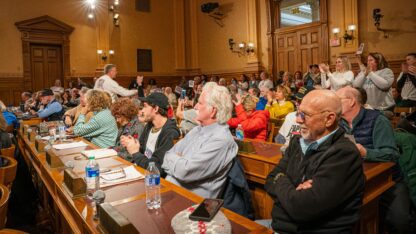Stew’s new album Making It is, in part, about his relationship with his ex-girlfriend and songwriting partner, Heidi Rodewald.
The two musicians, who still work together professionally, dated each other for years. They collaborated on songs for their band The Negro Problem, as well as on orchestrations for Passing Strange, their semi-autobiographical Broadway musical about a young African-American trying to understand himself while traveling around Europe. But during Passing Strange‘s initial run in Berkeley, Calif., Stew and Rodewald broke up.
“At first we thought there was no way [our professional relationship] was going to be able to continue,” Stew tells Fresh Air‘s Terry Gross. “But you start to realize — as artists and collaborators — there’s a different kind of love. There’s a romantic love, and then there’s an art love, a collaborator love … that is really just as strong as romance.”
That second kind of love, he says, doesn’t end after a relationship.
“To me, it’s never-ending, because there’s nobody like her who was born in the same part of the United States, listened to the exact same radio as me, watched the exact same TV shows as me, saw the same punk bands as me,” he says. “You can’t break up with that. Romance can end, but I don’t think art really ends, as romantic as that might sound.”
Still, Stew says he had to coax Rodewald into writing about their relationship for the new album.
“She is not as comfortable as me with this sort of airing laundry,” he says. “I had to. I thought I was going to make this Making It record without her, actually. That was the idea. And then I realized that’s not going to be possible. She wasn’t as comfortable as me with doing this crazy thing. But I had to. It was like a demon I had to exorcise. I had to get it out.”
Interview Highlights
On His Eclectic Tastes As A Teenager
“It wasn’t that we didn’t like the music that was on. We loved the music that was on ‘soul radio.’ But we just liked all music. And we seemed weird because we liked all music.
“Musicians are always eclectic. Musicians are always curious and hungry for new things. It wasn’t unusual. But when I had to navigate on my own — like holding those [David Bowie] records on my own and having to defend my taste, and having to defending my taste suddenly meant having to defend my position within my culture, which was something that I just didn’t see the connection with. I didn’t understand why what I was interested in — the kind of art I was interested in — had to reflect on my membership in my community. I didn’t see the connection.”
On Explaining Why He Liked Certain Musicians
“I had to explain why I liked things. And that’s the hardest thing in the world to do: to explain why you like something. To explain why you like a song, or why you like the sound of three guys from England harmonizing, is almost impossible to explain. You can’t explain why you like something. The bigger question for me was always to the people asking me to explain. [I’d say], ‘Why don’t you want to hear this?’ I love finding out why people don’t love things. And if you ask people why they don’t like things, particularly when they get into this sort of culture box, you find out that they’re not liking things because of what people are going to think about them, and not because of what the things actually sound like.”
On What Was Projected Onto Him When He Went To Europe
“That I must know somebody in Grandmaster Flash. They immediately think everything they see on TV. They think that you’re from a really, really hardcore ghetto. And this is … pre-Internet. They really had no idea. So they would assume immediately that you were from the hood. And the hood, in their mind, was a compilation of every single cop show, action movie that they’d ever seen in their lives. All these things were expected of us, like we would be great dancers. You would go to a discotheque and people would immediately form like a circle around us. And I’m like, ‘I’m not going to do anything worth watching. Stop looking at me. Just let me dance and not be looked at.’ It sounds like prehistoric times. Now kids in Munich know everything that kids in Brooklyn are doing. … But back then, you didn’t really know, and you could make up whatever you wanted because nobody knew.”
Copyright 2017 Fresh Air. To see more, visit
Fresh Air.
9(MDAxODM0MDY4MDEyMTY4NDA3MzI3YjkzMw004))
9(MDAxODM0MDY4MDEyMTY4NDA3MzI3YjkzMw004))






